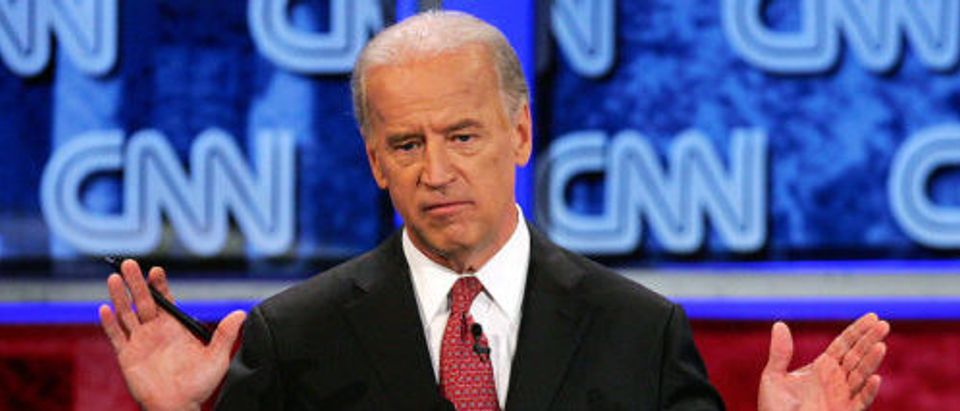Joe Biden seems to think it’s 1972 again, because he’s talking about China as if it were still a third-world backwater, rather than the greatest contemporary threat to America’s economic and military hegemony.
Biden was first elected to the U.S. Senate in the same year as Richard Nixon’s infamous “opening” of China that ended the communist country’s diplomatic and economic isolation. Since then, he’s been able to watch Beijing’s rapid ascent from the highest levels of the U.S. government. Somehow, though, he still can’t seem to grasp the danger this poses to American interests. Perhaps Biden’s mind is frozen in the snapshot of 1972.
“China is going to eat our lunch? Come on, man,” he remarked at a campaign event in Iowa. “I mean, you know, they’re not bad folks, folks. But guess what? They’re not competition for us.”
I’ve heard of wishful thinking, but that’s just downright delusional. China is easily America’s biggest — and some would say only — serious competitor on the world stage, and its government has been acting with increasing arrogance as it steadily narrows the economic gap with the U.S.
According to Biden, however, China’s failure to sort out internal corruption or solve its regional challenges makes it inherently weak — a stunningly naive statement from someone who should be intimately familiar with Beijing’s recent economic and military rise — a rise noted by the next chairman of the Joint Chiefs, Army Chief of Staff Mark Milley, as something we must focus on.
“They can’t even figure out how to deal with the fact that they have this great division between the China Sea and the mountains in the east, I mean the west,” Biden confusingly asserted. It’s unclear what Biden meant, though, since the only thing dividing those two geographic features is China itself.
He also scoffed that Chinese leaders “can’t figure out how they’re going to deal with the corruption that exists within the system,” as though corrupt politicians were a problem unique to China.
Then again, Biden may have special insights into the extent of political corruption in China. While serving as vice president in 2013, he took his son, Hunter, with him on an official trip to Beijing, and just 10 days later, a company owned by Hunter Biden signed a billion-dollar deal with the state-owned Bank of China.
However, none of Biden’s examples actually substantiate his underlying assertion that China is inherently weak. By Biden’s logic, America is in pretty dire straits, as well — after all, we still haven’t rooted out the rampant political corruption within the FBI that led to a failed coup against our president, and the entire Democratic Party is obstinately obstructing President Trump’s efforts to solve the widely-acknowledged humanitarian and security crisis on our border.
For decades, China has treated the U.S. as an adversary, challenging American interests at every opportunity and seeking to frustrate our diplomatic goals — most visibly through its decades-long sponsorship and protection of the rogue regime in North Korea.
China’s rapid economic expansion also poses a major challenge for U.S. security — the more China grows its economy, the more it will be able to invest in military expansion and modernization, which could eventually threaten to erase the strategic advantage that American forces currently have in East Asia.
Biden’s shockingly naive comments about China only prove one thing — he has an unhealthy fetish regarding China. This 1972-esque naïve perspective is dangerous and potentially catastrophic to the military and economic interests of America and our allies.
To the extent that our foremost rival on the world stage does have weaknesses, we should seek to exploit those weaknesses for our own competitive advantage, not use them as an excuse for passivity.
Biden’s cavalier dismissal of the threat posed by China’s ascendancy reflects his dangerously outdated perspective on world affairs. Entrusting this Chinese dupe with American foreign policy would be a monumental mistake.
Tony Shaffer (@T_S_P_O_O_K_Y ) is a retired senior intelligence operations officer who served more than 20 years with the U.S. Army. He is now president of the London Center for Policy Research in Manhattan and an adviser to Donald Trump’s 2020 presidential campaign. He is the author of the New York Times bestselling memoir “Operation Dark Heart: Spycraft and Special Operations on the Frontlines of Afghanistan.”
The views and opinions expressed in this commentary are those of the author and do not reflect the official position of The Daily Caller.


